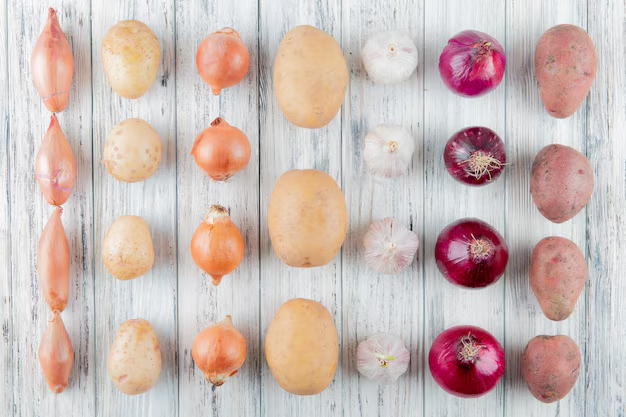Should You Store Onions in the Refrigerator? A Comprehensive Guide
Picture this: you're cooking a delicious meal, and you reach for an onion in your pantry, only to realize it's gone bad. That's when you wonder if it would have lasted longer in the refrigerator. But is it actually okay to store onions in the fridge? Let's explore this question in depth and provide you with actionable insights into onion storage.
The Science Behind Onion Storage
When it comes to onions, understanding their composition helps us make informed decisions about their storage. Onions are composed of water, natural sugars, and layers that protect them from decay. Their high water content makes them susceptible to mold and spoilage in moist environments.
How Refrigeration Affects Onions
Refrigeration slows down the growth of bacteria, which is why many foods last longer in the fridge. However, onions release moisture, and when confined to a fridge, they can spoil faster due to the damp environment. Moreover, the cooler temperature can affect the onion's texture, making it mushy over time.
Finding the Right Storage Method
To ensure you get the most out of your onions, it's essential to store them in a way that maintains their freshness and flavor. Here are some effective storage methods you might consider.
Storing Whole Onions
Ideal Conditions: Whole onions should be stored in a cool, dry, and well-ventilated area, like a pantry. A wire basket or mesh bag can facilitate air circulation, keeping moisture at bay and preventing spoilage.
Takeaway: 🏡 Pantries are ideal for whole onions — keep them dry and ventilated.
Refrigerating Cut Onions
Once an onion is cut, it becomes more prone to spoilage and bacteria. Storing it in the fridge can be beneficial for a short period.
Practical Tip: Store cut onions in airtight containers to mitigate moisture retention and prevent other foods in the fridge from absorbing their aroma.
Takeaway: 🥄 Use airtight containers for cut onions to control odor and moisture.
Addressing Common Concerns
There are several myths and concerns surrounding the storage of onions. Let’s address a few of them.
Do Onions Absorb Fridge Odors?
Onions are known to absorb smells, which can alter their flavor. If they absorb unfamiliar odors from the refrigerator, it could affect the taste of your prepared dishes.
Do Onions Cause Potatoes to Spoil?
It's advisable not to store onions and potatoes together. Onions emit ethylene gas, which can expedite the ripening and spoilage of potatoes. Separating them in the storage space ensures they both last longer.
Exploring Alternatives to Refrigeration
Refrigeration isn’t the only option for extending the life of onions. Let's consider some effective alternatives.
Freezing Onions
If you find yourself with extra onions, freezing them is a practical solution. Chop them into desired sizes and store them in freezer bags. This method maintains flavor and makes it convenient for later use in cooked dishes.
Dehydrating Onions
Dehydrating onions is another method to preserve them for a longer time. When dehydrated, onions can be stored in airtight containers and later rehydrated for use in cooking.
Integrating Onions into Your Meal Prep
Understanding how to integrate onions into your meal prep routine can help you manage quantities and minimize waste.
Plan Your Meals
Meal planning with onions in mind can prevent the need to store them for long periods. Recipes often require a base of sautéed onions, so incorporating them strategically can ensure they are used before spoilage.
Batch Cooking
Batch cooking meals can necessitate the use of several onions at once. This technique not only helps in using up your onion supply but also saves time during hectic weeks.
Ensuring a Balanced Refrigerator Environment
A balanced refrigerator environment helps in maintaining the freshness of foods stored within it, including onions.
Managing Fridge Odors
Using solutions like baking soda can help neutralize odors in the fridge, preventing onions from absorbing unattractive smells.
Organizing Your Fridge
Keep onions away from fruits and aromatic foods. Efficient organization contributes to better air circulation and preserves their flavor integrity.
Practical Guidelines for Onion Usage
Ultimately, how and when you use your onions is key to maximizing their freshness.
Use Fresh When Possible
Although refrigeration can help extend life, using fresh onions when possible offers the best flavor and texture for your meals.
Recognize Signs of Spoiled Onions
Look for signs like soft spots, off-smells, or mold to identify when onions have gone bad.
Quick Reference 📝
Here's a handy summary of the main points for easy reference:
- 🌱 Whole Onions: Store in a dry, cool, well-ventilated space like a pantry.
- 🔪 Cut Onions: Refrigerate in airtight containers to preserve freshness.
- 🍽️ Onion Usage: Incorporate into meal prep and batch cooking to minimize waste.
- ❌ Avoid Storing: Onions and potatoes together — they cause each other to spoil faster.
- ❄️ Freezing & Dehydrating: Useful methods for long-term storage.
- 🧊 Managing Odors: Ensure fridge freshness with odor-neutralizing solutions.
Engaging with these practices can transform how you handle onions in your kitchen, enhancing both their longevity and the quality of your culinary creations. By applying these insights, you can enjoy the full flavor and nutritional benefits of onions in your cooking.

